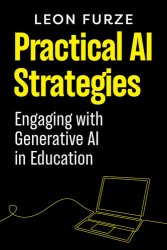Practical AI Strategies: Engaging with Generative AI in Education
- Добавил: literator
- Дата: 23-03-2024, 21:52
- Комментариев: 0
 Название: Practical AI Strategies: Engaging with Generative AI in Education
Название: Practical AI Strategies: Engaging with Generative AI in EducationАвтор: Leon Furze
Издательство: Amba Press
Год: 2024
Страниц: 198
Язык: английский
Формат: pdf, epub (true), mobi
Размер: 10.1 MB
Amid the discourse surrounding the controversial role of generative AI in education, Practical AI Strategies goes beyond the hype to explore the opportunities and challenges of the technology in K-tertiary education. The book looks past individual applications to explore the broader landscape of generative AI, offering educators invaluable insights into its workings and ethical considerations.
Divided into six parts, Practical AI Strategies guides readers through the construction and ethics of generative AI technologies, navigates policy landscapes and provides practical strategies for using these technologies in education. Detailed sections on text and image generation provide a solid foundation for using generative AI, and prepare educators for multimodal technologies on the near horizon including video, audio and 3D generation.
Leon Furze prompts educators to engage critically with generative AI and consider the near future of this rapidly developing technology. He encourages readers to navigate this terrain with an open mind and a discerning eye, and stresses the need for educators to have the fundamental skills to work with generative AI.
Generative artificial intelligence (GenAI) is a subfield of AI in which ML is applied to large datasets in order to learn ways to generate new data. That data might be in the form of text, code, images, audio or anything else that can be turned into machine-readable content. In practice, that means that GenAI models are multimodal and can both read and create data in a variety of modes, such as text generation, audio (like speech-to-text), and even video and 3D assets. Current AI models, such as OpenAI’s GPT and Google’s PaLM and Gemini (the basis for its Bard chatbot), are dominating the headlines. Microsoft has built its Copilot products on top of the GPT model, and open-source models like Meta’s Llama continue to grow in both popularity and sophistication.
Code generation predates ChatGPT, but hasn’t made a huge splash in education simply because not a lot of teachers code. Increasingly, though, these technologies can be used via natural language prompts to create fully functional software. This means that soon you’ll be able to type (or speak) to an application that creates a working app in minutes or even seconds.
Right now, you can use GitHub Copilot (owned by Microsoft), ChatGPT, Google’s Bard chatbot and a variety of other LLM-based applications to generate – and in some cases execute – code in many languages. Programming languages, just like written and spoken human languages, form a large part of LLM datasets. Some, like GitHub’s, are specifically trained on code and finetuned to produce code in ways which exceed the skills of more general-purpose models like ChatGPT.
Programming languages like Python, HTML, CSS, jаvascript and C++ can all be generated with these models, meaning you can theoretically build applications, plugins, websites and all manner of software even with very low levels of technical understanding. In my experience, it’s not yet possible to code fully-fledged and complex apps without some technical understanding, but that will change over time.
In my own experiments, I’ve created websites from sketches using ChatGPT’s image recognition, generated working models of physics experiments with code interpreter, and built very simple games and applications.
Contents:
Скачать Practical AI Strategies: Engaging with Generative AI in Education
[related-news] [/related-news]
Внимание
Уважаемый посетитель, Вы зашли на сайт как незарегистрированный пользователь.
Мы рекомендуем Вам зарегистрироваться либо войти на сайт под своим именем.
Уважаемый посетитель, Вы зашли на сайт как незарегистрированный пользователь.
Мы рекомендуем Вам зарегистрироваться либо войти на сайт под своим именем.

